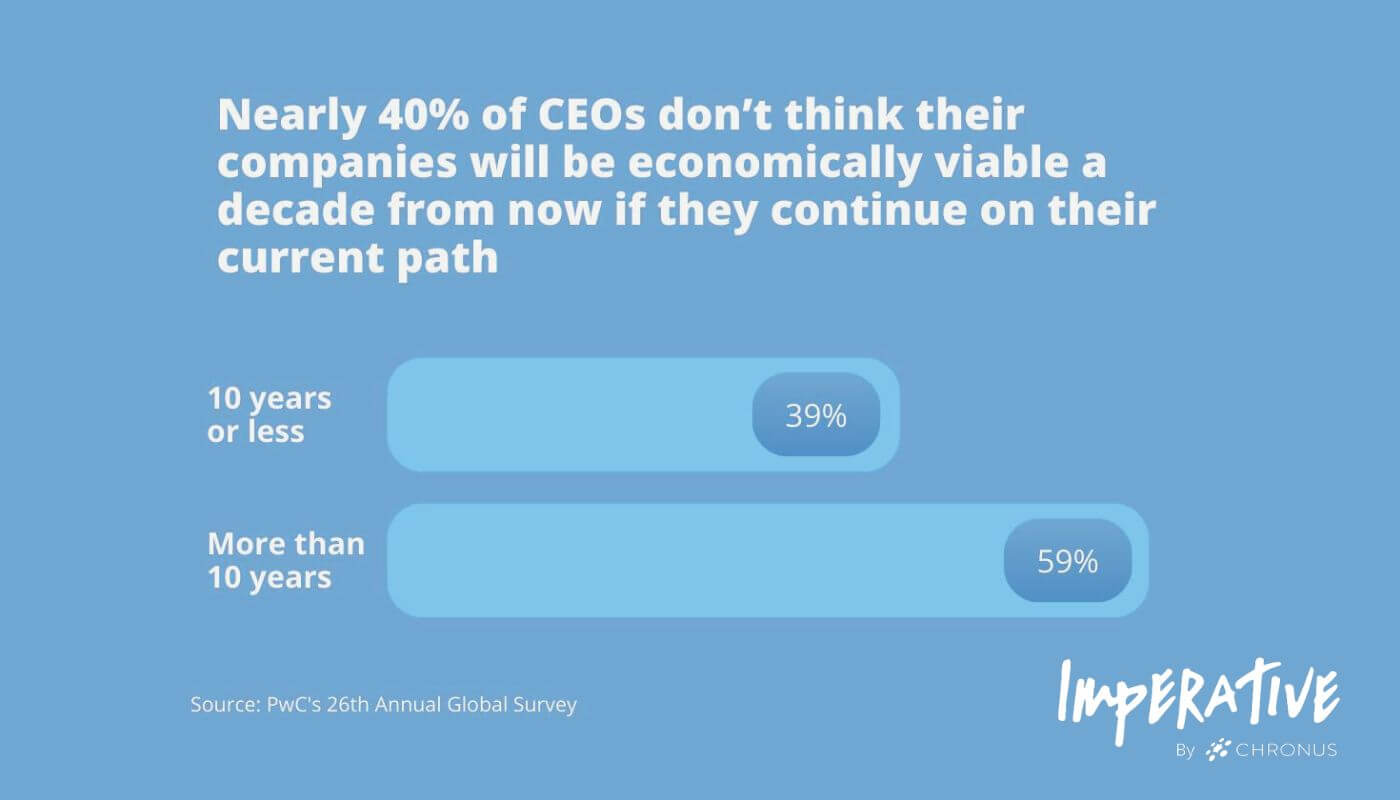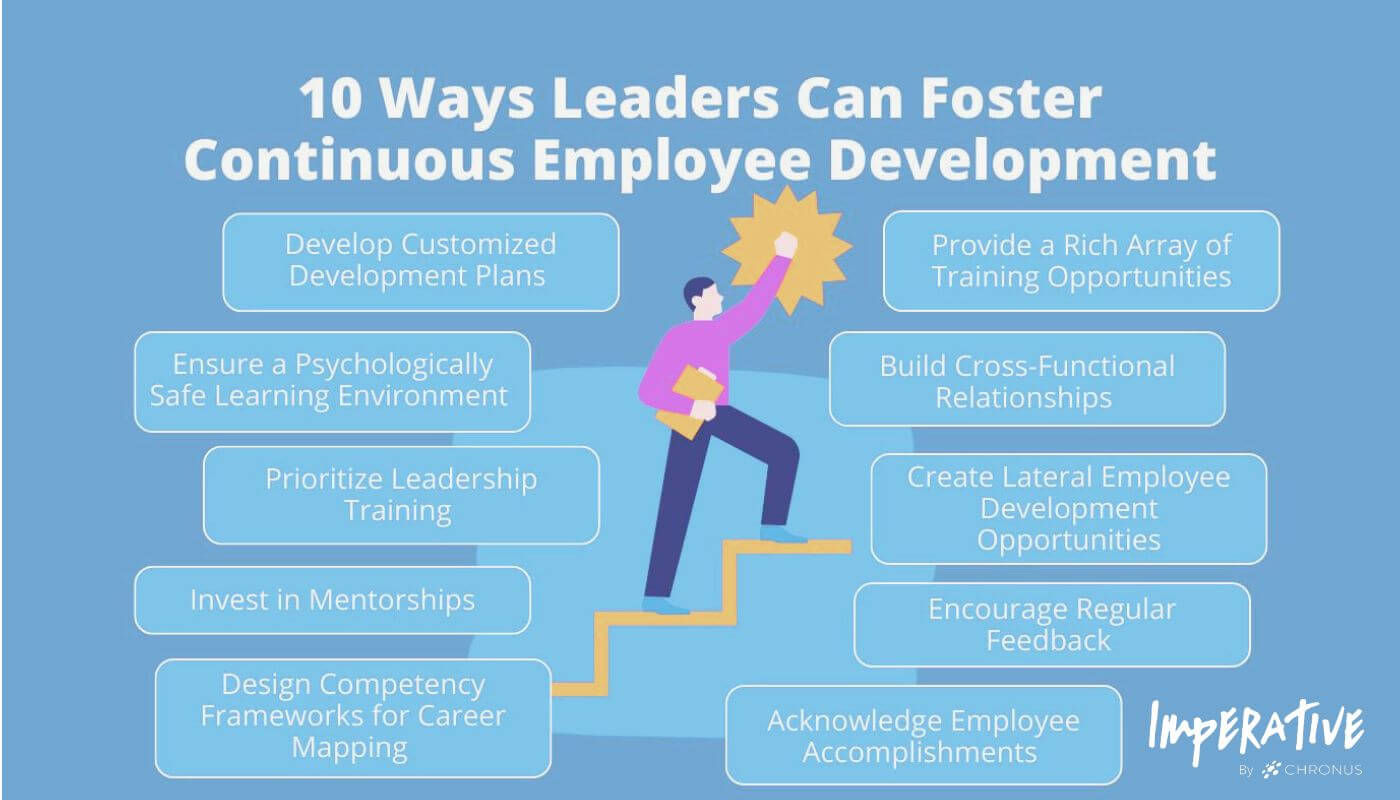The landscape of today’s workplace isn’t what it was twenty years ago. It’s not even what it was twenty minutes ago – today’s environment is both fast-paced and competitive. Ninety-one percent of millennials (born between 1977 and 1997) expect to stay in a job for fewer than three years. That makes it all the more imperative that employers find a way to keep employees energized, often with an employee development plan.
Unfortunately, employee loyalty just isn’t a given anymore. The modern-day workforce has experienced various changes in the economic climate. Employees have come to expect that if they invest in their employer, their employer should invest in them.
Christina Merhar of Zane Benefits wrote, “Companies can’t remain passive about their employee development programs because the cost of losing talent is high. On average, every lost employee costs about six to nine months of that employees’ salary to replace. And that doesn’t count the indirect costs of lost productivity.”
This article outlines the advantages of a professional development plan (commonly referred to as an employee development plan), various types of employee development plans, and the mutual benefits they offer to both employees and employers.
Whose Responsibility is Employee Development?
Employee development programs are pivotal for organizational success. By elevating employees’ current skills and capabilities, companies experience reduced turnover rates, improved job satisfaction, and the ability to expand with a skilled workforce.
But the path to effective employee development isn’t always clear-cut. The concept of employee development as an umbrella term for numerous types of training, mentoring, and upskilling initiatives can be vague. And in some companies, it’s unclear who should drive development or what it entails. Traditionally, there have been two options:
1. Leaders Take Charge of Employee Development Plans
In this scenario, leaders may prescribe employee training programs based on organizational needs.
Example: A company’s professional skills audit reveals that no one in the organization possesses artificial intelligence engineering experience. To combat this, leaders require all technical employees in the engineering department to complete an artificial intelligence training program, regardless of their personal interest in this area. Leaders will select the course and cover training costs, and employees must complete it within a given timeframe.
2. Leaders Take a Hands-off Approach to Employee Development
Leaders leave training decisions down to the individual employees. They might offer a budget or ask workers to research additional training they could complete to further their careers. But there’s no real plan to integrate continuous development in company culture.
Example: Maria is excited to start with a new company after the talent acquisition team promises her rich growth and development opportunities. Speaking to her new manager, she understands that the onus is on her to figure out what training she would like to participate in, and then she can submit the course options and costs for approval. Maria doesn’t quite achieve the professional growth she’d anticipated. Her manager doesn’t take an active role in Maria’s development, and also fails to provide adequate time to allow her to complete training alongside her workload.
Neither option is perfect, but a third approach emerges that could unlock tremendous opportunities in your organization.
3. Leaders Empower Employees to Take Ownership of Their Professional Growth
Leaders hold regular development conversations with employees, carve out dedicated time for training, and provide access to tools and resources (including themselves). By doing so, they support their employees in building a growth mindset and actively shaping their own career paths.
Example: Wayne is an employee with a strong interest in emerging technologies. His manager encourages him to explore his passions and identifies potential growth areas in the programming language F#. Wayne receives dedicated time for training, access to relevant resources, and regular development conversations. With his manager’s guidance, Wayne crafts a career development plan that includes online F# courses, participation in industry webinars, and even a small F#-related project within his team. This approach enhances Wayne’s skills and aligns his interests with the company’s strategic direction. Best of all, Wayne doesn’t need to switch companies to further his career.
However, this approach isn’t without its challenges. Author, speaker, and consultant Julie Winkle Giuloni has witnessed a recent lapse in employees holding themselves accountable for their own career progression. In an article for HR.com, she outlines that the rise of employee burnout, anxiety, and confusion about their future careers may all cause workers to take a step back from accelerating their professional development.
“As I talk with managers and leaders, I’m hearing a disturbing trend,” Giuloni said. “While employees may express a desire to develop their careers, they may be taking a less active role in making it happen.”
Strategy Facilitator Alex Brueckmann believes the responsibility lies with leaders to motivate their employees to own their development journeys. It’s about going back to basics and setting a good example.
“In larger organizations, I’ve been observing a development fatigue when leaders don’t walk the talk. It’s a bit like in parenting: when kids want to do sports because they see how their parents enjoy being physically active. A couch potato rarely raises an Olympian.”
Professional Development Plans Explained
Professional development plans outline the goals, skills, competencies and milestones that an employee needs to meet to develop (and in most cases move up) through the organization. In most cases, the manager and the employee work on it together to make it specific and tailored to the employee’s individual goals. Together, they identify how the employee can work towards those goals in their day-to-day work, and what support they might need to do so.
Types of Employee Development Plans
Employee development can come in many forms. Some companies might have a general professional development plan that doesn’t have a specific goal and path and contains a guideline of the skills and goals an employee in that role typically strives towards, or what the company expects in terms of progression.
Other plans might focus on leadership development. In these instances, a company often identifies high-potential employees who may be prospective leaders, and they participate in a plan that helps them cultivate the necessary skills (and experience) to be leaders. One of the biggest benefits of a leadership development program is that it provides a low-stakes environment for an employee to learn (and potentially experience) what it can be like to be a leader in a company. This can help with employee engagement, and ensure that if the employee advances through the company and becomes a leader, they’re ready to hit the ground running on day one.
A professional development plan might also focus on long-term career development—ideally tailored to the employee’s career goals including:
- Leadership Development: Elements of leadership development if they aspire to be a manager.
- Specialized Knowledge Development: Becoming the go-to expert in their fields might involve a deeper level of specialization.
- Changing Career Paths: For those looking to move into a different field, a career development plan can help them carve a path that doesn’t require leaving the organization.
Benefits of Employee Development Plans
Employee development plans are mutually beneficial for employers and employees. According to a survey by research firm Gallup, companies who invest in learning and development are more likely to cultivate a high-performance culture, are twice as likely to retain their employees, and have reported 11% greater profitability.
How Employee Development Plans Help Employees
- Enables engagement and belonging: Employees at every level want to feel engaged. Along with staying engaged in the workplace, employees want to see a clear development path in front of them. The more motivated an employee feels, the more useful they are to the company and the longer they’ll stay with the company. We’re not referring to an overworked staff. We’re referring to a well-motivated staff. That’s where a defined employee development plan comes in.
- Provides opportunities for growth and advancement: According to a McKinsey study, one of the top reasons people leave a company is lack of career development. An employee development plan signals to employees that opportunity for advancement exists, and also provides a clear path on how to get there if the employee desires. The existence of a standardized employee development plan reassures interested job seekers that a company is invested in their long-term success and advancement in the organization. As Bersin stated, “Companies with career management programs are better able to attract and retain top talent, leading to higher employee engagement and, in turn, a positive impact on the bottom line.”
- Builds confidence
Sometimes, an employee needs a little confidence boost to take on challenging projects or advocate for themselves regarding promotion. An employee development plan can help build confidence by arming them with additional skills and knowledge, and experience to try new things (and make some mistakes in the process) without having negative career repercussions.
How Employee Development Plans Help Employers
As an employer, it’s only natural to wonder if investing in an enterprise approach to employee development is really worth the resources it requires. The answer is yes. Here are three ways that an employee development plan can help employers.
- Improves employee engagement and retention: Gallup estimated that actively disengaged employees cost U.S. businesses between $450 and $550 billion annually in lost productivity. Disengaged employees are also more likely to leave the organization. Another research estimated that voluntary turnovers cost the company one-half or two times the employee’s salary. A strong employee development plan can prevent organizations from becoming part of those statistics. When employees have the opportunity to learn and develop continuously, they’re more likely to be engaged in their work and see how their work impacts the company’s bigger vision. In turn, they’re more likely to stay with the organization.
- Provides pipeline of potential leaders
Hiring senior employees and leaders is an expensive and time-consuming endeavor for most businesses. An employee development plan can mitigate this by developing potential future leaders who know a lot about the company and have specific leadership training that is suited to the company’s reality and culture. - Improves skill shortage and upskilling
We’re living in a constantly changing labor market, where today’s most sought-after skills might not be relevant in five years. And when companies don’t plan for that change, they can find themselves with a massive gap in workers. Employee development programs can prevent that by ensuring that they’re continuously upskilling their workers according to market demands.
Examples of Employee Development Plans
There is no one-size-fits-all development plan, and what works for one employee in an organization may not be suitable for another employee in the same organization, or an employee in a similar role employed by a competitor. Job listing site Indeed has provided the following template that can provide a great starting point:
| Employee Name: | |
| Job Title: | |
| Professional Goals: | |
| Step 1: | [Timeline & actionable steps required to achieve goal] |
| Step 2: | [Timeline & actionable steps required to achieve goal] |
| Step 3: | [Timeline & actionable steps required to achieve goal] |
Here are examples of potential goals that could fit into a development plan
| Employee Name: | Jane Doe |
| Job Title: | Marketing Specialist |
| Professional Goals |
|
How To Create A Successful Employee Development Program
To reap the benefits of employee development programs, companies must be intentional about creating programs that are suitable for their company reality. While that will look different for every organization, below are some best practices that are worth following:
1. Focus on holistic development
While it’s important for companies to focus on teaching their employees the appropriate skills to do their jobs well, the program should empower employees to develop a mindset of resilience. This is necessary to adapt to a dynamic, ever-changing workplace, according to an article by Harvard Business Review.
2. Design for personalization
Every employee will have different professional aspirations, as well as different strengths and weaknesses. That’s why companies need to allow for personalization. That means providing different types of training and acknowledging that every employee has a unique path at the company.

3. Enable different styles of learning
It’s also important to acknowledge that every person learns and retains information differently. For some, a classroom-style environment is how they learn best. Others prefer to sit through a recorded webinar, so they can pause and start as they wish. Then some learn best through watching and doing, in which case a job-shadowing approach might be best.
4. Provide opportunities for microlearning
In addition to having different learning styles, employees will have different schedules and time commitments. Microlearning breaks down lengthy training materials into shorter sessions and bite-sized content. This allows employees to learn at their own pace and modify their commitments depending on workload.
5. Incorporate mentorship
Lastly, employee development programs only work with the right accountability structure and support systems. That might be through traditional one-on-one arrangements, group mentoring, or mentoring circles where employees learn together and provide support and feedback to each other.
How Can Leaders Foster An Environment of Continuous Employee Development?
There’s always a case for incorporating traditional training sessions into your development programs. But L&D should be more than a checkbox exercise where leaders send their employees off to complete their annual skills training and don’t think about it again for another year. Instead, continuous employee development happens in the flow of work, ensuring that growth is synonymous with company culture and never something you have to squeeze in alongside a busy workload.
Here are ten ways for leaders to create employee development initiatives that inspire employees to power ahead toward their career goals.
1. Develop Customized Development Plans
Effective career development isn’t one-size-fits-all. Each employee should have an individual employee development plan that is tailored to their specific needs and goals, including some or all of the following:
- Personalized employee goals: Clearly defined short-term and long-term objectives aligned with the employee’s role and career aspirations.
- Skills assessment: Identification of existing strengths and areas for improvement through self-assessment and manager feedback.
- Suggested learning methods: Selection of appropriate learning resources, such as workshops, online courses, on-the-job training, mentoring, or conferences.
- Timeline and milestones: Realistic dates for achieving milestones and goals, ensuring a structured and realistic progression.
- Employee feedback mechanisms: Regular check-ins are scheduled with managers or mentors to review progress and receive feedback.
- Performance metrics: Defined metrics to measure progress and success, such as improved task completion times or increased customer satisfaction scores.
- Stretch tasks and specialist projects: Inclusion of challenging tasks or projects to encourage stepping out of the comfort zone and promoting growth.
- Networking opportunities: Suggestions for networking events, conferences, or workshops to expand professional connections and industry knowledge.
By working through these highly individual details, leaders can take the time to get to know individuals, assess their progress, and suggest resources that align with employee and organizational goals.
2. Ensure a Psychologically Safe Learning Environment
Any type of training or growth requires a learning curve. Employees must feel free to make mistakes, ask questions, and have opportunities to put learning into practice without fear of failure or judgment. Leaders can create a psychologically safe learning environment by:
Setting clear rules and expectations around respectful behavior, collaboration, and constructive feedback.
- Recognizing that everyone learns at their own pace and is individual in the way they learn best.
- Offering support and guidance to all employees as they try new skills or concepts.
- Encouraging a culture of open dialogue and honest feedback to reduce the fear of failure.
- Allowing employees to shadow colleagues or gain additional coaching from mentors when needed.
- Offering incentives for taking risks and experimenting with new methods, then celebrating them whether they’re successful or not.
By setting up this supportive environment where mistakes are a byproduct of successful growth, leaders empower employees to take ownership of their professional growth and step out of their comfort zones in a safe space.
Example: Software company Menlo Innovations hangs a sign in its office with a reminder to “Make mistakes faster.” As Chief Happiness Officer Alexander Kjerulf puts it, “Mistakes are an integral part of doing anything cool, and interesting and the sooner you can screw up, the sooner you can learn and move on.”
3. Prioritize Leadership Training
The best way to ensure that employees feel supported is to make sure leaders themselves have the training and resources required to develop highly skilled employees. Anyone working in leadership roles must also advertise that they’re actively pursuing their own career development, which sets a great example for employees to follow suit. Leadership development initiatives may include:
- Leadership skills: Teach leaders to work with their direct reports through coaching techniques that focus on listening, questioning, and brainstorming different options.
- Performance management: Train leaders to increase motivation, track performance progress, and deliver effective feedback.
- Communication skills: Provide tools to help leaders understand communication styles and learn how to tailor their approach based on the individual. For example, one employee might prefer to receive written feedback they can review several times to let it soak in, while others thrive from face-to-face interaction.
- Emotional intelligence: Help leaders understand the role of emotions in workplace relationships and create a safe environment for employees to express themselves without judgment.
- Conflict resolution: Teach leaders how to identify, manage, and resolve disagreements in the workplace.
- Strategic planning: Help leaders learn how to set individual goals and objectives that align with overall business goals.
4. Invest in Mentorships
Historically, mentorships have produced excellent results—for example, Apple CEO Steve Jobs mentored Meta’s Mark Zuckerberg. And, according to LinkedIn’s Workplace Learning Report, employee mentorships are another top L&D priority in 2023.
The idea is straightforward. Employees pair with an experienced mentor who provides advice and guidance to help them reach their career goals. Mentorships also encourage peers to learn from one another, build relationships, and network across the organization. Leaders can support this effort by:
- Identifying mentors based on skill level, experience, and interests.
- Setting clear objectives for mentees and mentors.
- Specifying the duration of the program and how often they should meet.
- Using guided connections to improve employee engagement.
Chronus tip: Use our mentoring platform to host these peer or mentorship conversations, enabling employees to connect the dots between their personal strengths and their professional goals.
5. Design Competency Frameworks for Career Mapping
Employees should always understand what options are available to them within an organization. In an equitable company, everyone must be able to progress to any role as long as they demonstrate the necessary skills. Leaders can create this career mobility by establishing competency frameworks to clearly define each role regarding core competencies, responsibilities and qualifications required. Then, employees can use these frameworks as a roadmap to map out their path. A few ways leaders can establish robust competency frameworks include:
- Creating clear descriptions for each role highlighting what qualities and skills are needed.
- Identifying the desired outcomes to ensure that each role aligns with organizational goals.
- Collaborating with team members and stakeholders to get feedback on each competency framework.
- Making sure job descriptions reflect any changes in roles or qualifications.
- Establishing a clear process for employees to apply, be interviewed, and accepted into new roles.
By designing these career paths, leaders can demonstrate to employees that their growth and development are valued and provide a framework for them to use as they continue to pursue their professional goals and objectives.
6. Provide a Rich Array of Training Opportunities
Leaders should focus on providing multiple forms of employee training, from classroom-style courses and live webinars to podcasts and online communities. This will help all employees find something that resonates with their learning style. For example:
- Kinesthetic learners respond well to hands-on, practical training, including simulations and experiments.
- Auditory learners prefer to listen to podcasts, group discussions, and lectures where communication is a priority.
- Visual learners may benefit from information presented in videos, infographics, and flashcards.
- Reader-writer learners prefer self-paced training using materials like books, articles, or access to learning experience platforms (LXP) and learning management systems (LMS.)
7. Build Cross-Functional Relationships
To create a holistic approach to employee development, leaders can collaborate with professionals from various functions, such as talent acquisition, talent management, and diversity, equity, and inclusion (DEI). By baking development into the entire employee experience, leaders can:
- Identify skills needed for future roles and align hiring practices with these skills.
Collaborate with talent management to create personalized employee growth plans that align with career trajectories. - Work with DEI teams to ensure that growth opportunities are inclusive and accessible to all employees, fostering diversity in skill sets.
8. Create Lateral Employee Development Opportunities
Horizontal career moves, such as job rotations and secondments, are vital for upskilling and reskilling employees while strengthening the talent bench. Integrating these moves into a talent development program can enhance employee growth and engagement. Leaders can emphasize the importance of lateral moves by:
- Encouraging employees to explore different departments or roles to acquire new hard or soft skills while gaining additional perspectives.
- Establishing a clear process for employees to express interest in lateral moves and ensuring equitable selection criteria.
Highlighting success stories of employees who have benefited from lateral development in terms of skill growth and career advancement.
Example: Laura works in sales but has long harbored an interest in learning more about working in communications. Laura’s manager liaises with a fellow leader in communications to create a job secondment arrangement for her, allowing her to gain experience in both departments while honing her communication and marketing skills.
9. Encourage Regular Feedback
Regular feedback is a cornerstone of development and something your workers crave. Inc. reports that Gen Z employees are the most demanding of the generations, with 40% expecting daily check-ins with their boss. They understand the value of ongoing, two-way feedback between employees and their managers or peers which can:
- Facilitate continuous improvement by giving employees insights into their performance and growth areas.
- Create an environment where employees feel valued and supported in their development journey.
- Help employees set meaningful goals and track their progress over time.
Imperative Tip: Our platform is ideal for hosting structured feedback conversations that align with employees’ strengths and development goals.
10. Acknowledge Employee Accomplishments
Recognizing and celebrating employee achievements is a powerful way to reinforce positive learning behavior, with research suggesting that 83% of employees feel motivated by recognition in the workplace. Leaders can use rewards and recognition systems effectively by:
- Implementing an employee recognition program that acknowledges milestones, completed projects, and acquired skills.
- Tying recognition to the organization’s core values and strategic objectives to reinforce the importance of skill development.
- Sharing success stories and accomplishments through internal communication channels to inspire other employees.
How Chronus Can Help
A strong employee development program requires a solid foundation and system. Chronus can help you with that by taking care of the administrative tasks that running an employee development program requires. The software’s AI technology can also help with the following activities:
- Matching mentor/mentees
- Provide personalized learning pathways and training modules
- Generate reports that measure the ROI of your employment development program
Research from Bersin found: “Career development programs were the fourth highest best practice identified, with a strong correlation to business outcomes, generating almost 30 percent greater business impact.”
Employee development plans and programs help employees feel invested in their jobs and their company’s mission. A well-established program ensures that employees continue to feel driven to advance their own careers within the company and advance the mission of the company.




